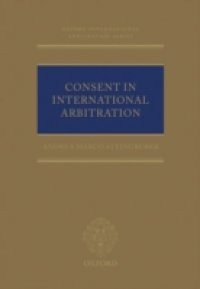Examining the notion, nature, and extent of consent in both commercial arbitration and investment arbitration, this book provides practitioners and academics with a thorough, case-related analysis of an issue which raises many questions. Whilst considering the evolution of arbitration and its consensual nature - enlargement of the parties' freedom to consent to arbitration, and development from commercial arbitration to investment arbitration - it addresses important theoretical questions to offer practical solutions. These include: how consent to arbitrate is expressed and when mutual consent to arbitration is reached; which law shall govern the arbitration agreement or, more particularly, consent as an element of the substantive validity of it; and, conversely, according to which law will a possible lack of consent be judged; how consent should be interpreted; which relationship exists between consent as part of the substantive validity of an arbitration agreement and its formal validity; which, if any,are the implied terms when consenting to arbitration; how consent to arbitrate influences procedural aspects (counterclaims, joinder, consolidation), and which solutions adopted by treaties, national laws or arbitration rules are, or would be, the most respectful of parties' consent in this respect;what in investment arbitration is the relationship between consent and most-favoured-nation clauses or the influence of umbrella clauses. The book includes original arguments and puts forward new suggestions with regard to the changeable consensual character of arbitration. It also provides a particular focus on problems that frequently arise in practice of international arbitration, for example issues related to complex multiparty arbitration and to jurisdictional questions in investment arbitration.

